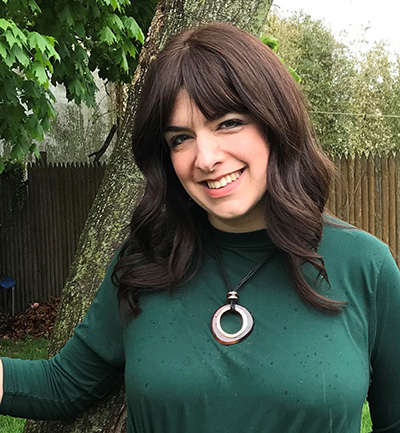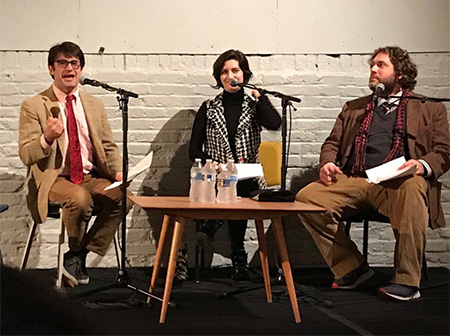American View
Feature
A (Facebook) Group for Every Jewish Interest
 The picture of the brightly colored dress prompts excited back-and-forth conversation. The woman who shared the image wants to look her best at an upcoming family bar mitzvah, but she wants to know if the pink is too garish. Happy to weigh in, her friends and acquaintances regale her with a cacophony of opinions: It needs a good seamstress and It’s perfect—and why focus so much on clothing, you’ll look beautiful no matter what!
The picture of the brightly colored dress prompts excited back-and-forth conversation. The woman who shared the image wants to look her best at an upcoming family bar mitzvah, but she wants to know if the pink is too garish. Happy to weigh in, her friends and acquaintances regale her with a cacophony of opinions: It needs a good seamstress and It’s perfect—and why focus so much on clothing, you’ll look beautiful no matter what!
At a separate gathering, a number of women are reacting angrily to an uncomfortable incident at a craft store in Florida. Recently, one of them had gone in looking for holiday paraphernalia and was aghast that a salesperson told her they no longer carry many Hanukkah items because they don’t want to offend anyone in the current political climate. Is this an anti-Semitic company policy, or the hateful actions of a lone employee? one asks. Others call for a boycott of the store.
At yet another space, a group is debating the perceived “goyishness” of green bean casserole. Most in the conversation agree that the American holiday dish, though delicious with crispy onions, is in fact not particularly Jewish. A few note some Jewish takes on the casserole—and then the conversation veers into a debate on the appropriateness of the term “goyish” altogether.
The venue of choice for all of these discussions—and many, many more—is Jewish Facebook groups, focused pages on the social media giant where members can post an image, question or article for discussion as well as comment on others’ posts. While Jewish conversations take place across digital platforms—on Twitter, WhatsApp and Tumblr, to name a few—many Jews look to Facebook groups in particular for community as well as for a way to connect with others outside their immediate religious and geographic environment.
Indeed, the past few years have seen an explosion of these Jewish-focused Facebook gatherings, colloquially known as “Jewbook.” There are well over 1,000 groups with “Jewish” or “Jews” in their names, and these are just a fraction of the others that don’t specify “Jewish” in their title.
Most of them are “public,” in Facebook parlance, and can be joined with the click of a mouse; some are “closed,” requiring admission by an administrator or an invitation from a member. A smaller number are “secret”—meaning they are not publicly visible and only current members can add new ones. Both closed and secret groups are considered private, and posts or comments cannot be shared without permission.
Some of the largest associations have memberships in the tens of thousands, and average over a dozen new discussions per day. Posts on Jewish Women Talk About Anything, one of the most popular, can receive several hundred comments each. The forum, true to its name, hosts topics ranging from the mundane to the deeply personal. Another well-frequented group, God Save Us From Your Opinion: A Place for Serious Discussion of Judaism, is a space to debate the finer points of halacha, identity and practice. I Don’t Cook But I Give Out Recipes, while not explicitly Jewish, includes over 40,000 mostly Jewish recipe-swappers and is one of the dozens of food-related Facebook groups.
Many groups in the Jewish Facebook universe cater to niche interests. Educators have JEDLAB; observant female pop culture enthusiasts meet up on Orthodox Ladies United in Fandom. There is even a space for pet lovers—Jewish Pet Owners Unite.
“Everyone wants to feel like they’re part of some like-minded community,” says Chedva Tennenberg, a 47-year-old modern Orthodox woman who belongs to around 20 Facebook groups—though she is not active in all of them—including some for olim that she joined when she moved from New Jersey to Israel with her family in 2015.

At the same time, it is the range of backgrounds and perspectives in larger groups like Jewish Women Talk About Anything or God Save Us From Your Opinion that is part of their appeal.
“I’ve found it fascinating learning about all the different levels of observance in the group and the life experiences of Jewish women worldwide,” says 53-year-old Sharon Lubin, a Conservative/Masorti member of Jewish Women Talk About Anything who lives in London.
About 60 percent of members of Jewish Women Talk About Anything are Orthodox, though with “a very, very wide range” of beliefs and practices, notes creator Esther Lejbovitz, 37, from Far Rockaway, N.Y., who is Orthodox herself. The rest, she adds, are affiliated with other denominations, and a small minority are secular.
Depth and diversity of perspectives are what bring New Yorker Julia Kite, 33, to God Save Us From Your Opinion, about half of whose members are Orthodox, with the rest from other denominations as well as a number of atheists and non-Jews. “It’s a good reminder,” says Kite, who identifies as both Reform and secular, “that even if we’re Jewish, we’re going to have multiple frames of reference, and there is very rarely complete agreement.”
Others find the groups indispensable for both emotional and practical support. Although Tennenberg feels relatively settled in her Jerusalem home, she looks to Living Financially Smarter in Israel and Restaurant Club Jerusalem as well as other spaces for English-speaking immigrants for advice—from the best school for her kids to the difference between shamenet and shamenet lebishul, sour cream and heavy cream.
When Tennenberg’s eldest child was preparing to enter the Israel Defense Forces last year, she joined a group for English-speaking parents of soldiers, which she says has been invaluable. “People will ask, ‘My kid is going into the army, what do I really need to buy them?’ ” Tennenberg says. Israeli parents “don’t need a group like that because they’ve been through it. I didn’t know you can only have gray socks and white socks!”
It’s not surprising that people are flocking to Facebook for Jewish engagement, says Mira Sucharov, a political science professor at Carleton University in Ottawa and author of the new book Public Influence: A Guide to Op-Ed Writing and Social Media Engagement. “It’s convenient, you can use it anywhere, and it gives immediate feedback.”
Sucharov says there are two kinds of Jewish Facebook groups: those in which like-minded Jews share ideas, such as Orthodox Ladies United in Fandom; and broader, less philosophically minded groups, like Jewish Women Talk About Anything. She sees the proliferation of Jewbook as an expression of what she calls “DIY Judaism,” which, she notes, is growing in popularity “in real life” as well (IRL, as it is known digitally). For example, she says, more people today are having bar and bat mitzvah ceremonies outside of synagogues, sometimes even without a rabbi. People have a sense that “we can find our community where we want and on our terms.”
For some people, online communities can feel welcoming in a way that local ones don’t. “Lots of people tell us they haven’t found a synagogue they like, or that they’ve been turned off by traditional Judaism,” says Mark Oppenheimer, 44, who started an eponymous group in 2017 for fans of Unorthodox, the podcast from the online magazine Tablet that he co-hosts.
To get a sense of this dissatisfaction, consult Jewbook itself. Recurring posts on God Save Us From Your Opinion, which launched in 2014, center on the ways synagogues treat, and sometimes mistreat, individuals. For example, one post asks how shuls should behave toward those who refuse to become members, either because of ideological or economic reasons. Another questions the appropriateness of bringing a service dog to synagogue. The heated conversation threads that follow these kinds of posts often extend into other issues, such as the high cost of synagogue dues, inaccessibility of some Jewish institutions for people with special needs and racism within Jewish communities.
For others, dissatisfaction isn’t necessarily the issue—it’s the lack of a physical Jewish presence where they live. Twenty-three-year-old Cassidy Levy is a good example. “I’m at my first job out of college in Knoxville, Tenn., a city without much of a young Jewish population,” says Levy, who identifies as a Conservative Jew and posts and comments on the Unorthodox group, which has rapidly grown to 4,000 members since its creation. “It’s easier for me to connect to the larger Jewish community on Facebook,” she adds, “than it is for me to try to connect with strangers at the one shul I’ve been to here.”
Despite the sense of community, some discussions that touch on politics, gender or sexual issues—contentious topics outside Facebook, too—can become divisive, even nasty. Lejbovitz, who created Jewish Women Talk About Anything in 2014 and acts as one of its moderators, finds that political posts, whether about Israel or the United States, can be particularly difficult. “When people start saying in connection with a post ‘You’re a soulless woman,’ or ‘How can you call yourself a Jew?’ that’s when it has to stop,” she says.

In response to the growing tensions, Lejbovitz recently updated the group’s guidelines: “If you start a political thread, you are doing so with the intent to listen, learn and discuss,” the guidelines state. “If you feel too upset to respectfully discuss, this is NOT THE PLACE to share.”
Jewish Women Talk About Anything has developed a band of nine moderators who vary in levels of observance and political perspectives to ensure that decisions are fair, says Lejbovitz. A woman of color recently began moderating as well.
For its part, God Save Us From Your Opinion maintains a “strict civility code”—no name-calling, slurs or attacks on individuals or groups of people, says 35-year-old Jenna Mitelman, who lives in Minneapolis and serves as one of the group’s dozen or so moderators from various backgrounds. “You may think [another member] is a sinner, but you don’t get to say that.”
Overall, however, the positives of these groups far outweigh any negatives, their creators say, both online and IRL. In the aftermath of the shooting at the Tree of Life synagogue in Pittsburgh in October, for example, many people took to Jewish Facebook groups to share links to charity drives for the synagogue and the victims’ families as well as to express sorrow and solidarity.
And although the freedom of expression these groups afford can spark clashes, many see the opportunity to openly discuss religious identity and values as a benefit—a particularly Jewish one. In face-to-face religious communities, says Unorthodox’s Oppenheimer, “people feel they have to represent themselves well to co-religionists. We’re not trying to keep people ‘on the path.’ People can post in our group that they hate High Holiday services. The big tent includes people who are estranged from Judaism, or who have mixed feelings, as well as people who are 100-percent on board.”
Jennifer Richler is a freelance writer living in Bloomington, Ind.










 Facebook
Facebook Instagram
Instagram Twitter
Twitter
Martha Kaplan Backer says
Very informative, I spend a lot of time on Facebook, and have made up some closed groups of groups of neighbors, family and synagogue members (one from a synagogue that had disbanded so we can keep in touch.) The Jewish Women talk about Anything, and God save us from your opinion sound more like conversational places and may check them out.
Sharon Komforty says
I enjoyed reading about all the different Jewish Groups on Facebook. I may join one soon. Thanks for the
information.
David Sabghir says
Is there a Jewish Group that concerns Life Coaching?
Kenny Mann says
Very interesting. Is there a group for non-practicing, completely secular Jews?
https://www.vimeo.com/ondemand/beautifultree
https://vimeo.com/439171749
I spent about 9 years making this feature-length documentary about my parents’ journey from Eastern Europe to Kenya as Jewish refugees, and their subsequent legacy in their adopted home. As the daughter of secular Jewish parents, a white settler in an African country, and an Eastern European anti-colonial in a British colony I explore issues of identity for white Africans, like myself, who see Kenya as home yet are plagued by the feeling of not quite belonging.
#JewishrefugeesinKenya #Kenyaidentity #eastafricanhistory #colonialperiod